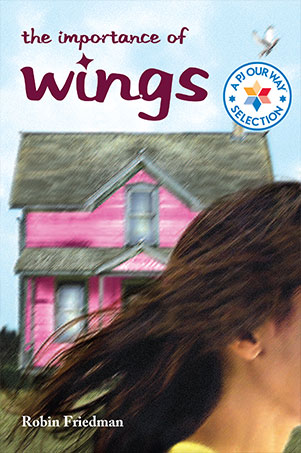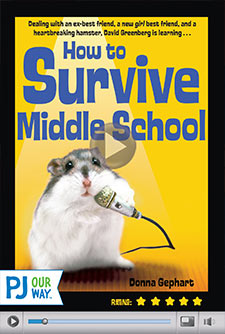The Importance of Wings
Wonder Woman can fend off bullets with her golden bracelets, force people to tell the truth with her golden lasso, and has fabulous hair to boot. Israeli-born Roxanne can’t even get picked in gym. What will she have to do to finally fit in?
Average Rating
( hint: Login to leave a review! )
130 Reviews
Leave Review
What the Book is About
Jewish Content & Values
Positive Role Models
Content Advisory
Talk it Over!
More for You
What the Book is About
What do Israeli-born Roxanne and her sister Gayle want more than anything else? To be American and to fit in. Roxanne worries about having the wrong hair, the wrong clothes, and being picked last in gym. With their mother back in Israel caring for their sick aunt and their father working late every night driving a taxi in the city, Roxanne and Gayle spend most of their time watching reruns of old TV shows about perfect all-American families. That's until a new girl moves into the “cursed” pink house next door. Beautiful, cool, athletic Liat is also Jewish and Israeli, and over the course of their friendship she teaches Roxanne the importance of being true to herself. Kids will relate to this frank portrayal of typical teenage angst set in an 80s retro-style background rich in Israeli culture and pride.
Jewish Content & Values
- There are many Israeli cultural references and Hebrew words in this book. A major theme is Roxanne’s struggle to accept her Israeli roots and identity.
- Roxanne’s family is not observant, although they do celebrate major Jewish holidays like Rosh Hashanah and Yom Kippur with traditional foods and a visit to the synagogue.
Positive Role Models
- Rivka, Liat’s father’s girlfriend, is a warm and loving figure in the lives of all three girls. She cooks traditional Israeli food for them and helps them to develop confidence and a positive body image during their teenage years. Her outrageous clothing choices and loving heart make her something of a cross between an older sister and mother-figure as she provides valuable guidance that the motherless girls are sorely missing.
- Liat is a confident Israeli-American role model for Roxanne. She encourages her to stop hiding behind her TV programs and to be confident and proud of her Israeli identity.
Content Advisory
- This book is appropriate for our readership, but does contain some very mild bullying and sexual innuendo that most children will miss: a passing comment about how a boy’s butt appears in his jeans and how a popular girl’s butt peeks out of her shorts may offend some readers. One character dresses provocatively in see-through shirts and two of Roxanne’s friends “make out like crazy.” An older boy punches and shoves a younger one. The children drink black beer (a classic Israeli low alcohol malt drink) with dinner, and Roxanne gets an accidental first kiss from a boy.
- The house that Liat’s family has moved into has a tragic history. Creepy stories about the fate of previous inhabitants may disturb some young readers, as may the knowledge that Liat’s mother died in a terrorist attack. While their mother is away in Israel, Roxanne and her sister are left home alone to worry and fend for themselves as their father drives a taxi until after midnight.
Talk it Over!
Although this book was published in 2009, it’s set in the 1980s. Many of your parents will remember the eighties well. How did their childhood differ from yours? How do you think Roxanne’s story might have been different had she grown up today?
More for You
In America, Jews often use their Hebrew names at synagogue, and their English names the rest of the time. In Israel, names are multi-purpose. In recent decades, names of Israeli Jewish kids have trended away from biblical, traditional choices like David, Yonatan, Rachel and Sara to catchy names like Noa, Shira, Tamar, Talia, Noam, Ori, and Itai. Non-gender specific names are also gaining in popularity: Noam, Ori and Daniel, are all popular choices for girls as well as for boys.
What the Book is About
What the Book is About
What do Israeli-born Roxanne and her sister Gayle want more than anything else? To be American and to fit in. Roxanne worries about having the wrong hair, the wrong clothes, and being picked last in gym. With their mother back in Israel caring for their sick aunt and their father working late every night driving a taxi in the city, Roxanne and Gayle spend most of their time watching reruns of old TV shows about perfect all-American families. That's until a new girl moves into the “cursed” pink house next door. Beautiful, cool, athletic Liat is also Jewish and Israeli, and over the course of their friendship she teaches Roxanne the importance of being true to herself. Kids will relate to this frank portrayal of typical teenage angst set in an 80s retro-style background rich in Israeli culture and pride.
Jewish Content & Values
Jewish Content & Values
- There are many Israeli cultural references and Hebrew words in this book. A major theme is Roxanne’s struggle to accept her Israeli roots and identity.
- Roxanne’s family is not observant, although they do celebrate major Jewish holidays like Rosh Hashanah and Yom Kippur with traditional foods and a visit to the synagogue.
Positive Role Models
Positive Role Models
- Rivka, Liat’s father’s girlfriend, is a warm and loving figure in the lives of all three girls. She cooks traditional Israeli food for them and helps them to develop confidence and a positive body image during their teenage years. Her outrageous clothing choices and loving heart make her something of a cross between an older sister and mother-figure as she provides valuable guidance that the motherless girls are sorely missing.
- Liat is a confident Israeli-American role model for Roxanne. She encourages her to stop hiding behind her TV programs and to be confident and proud of her Israeli identity.
Content Advisory
Content Advisory
- This book is appropriate for our readership, but does contain some very mild bullying and sexual innuendo that most children will miss: a passing comment about how a boy’s butt appears in his jeans and how a popular girl’s butt peeks out of her shorts may offend some readers. One character dresses provocatively in see-through shirts and two of Roxanne’s friends “make out like crazy.” An older boy punches and shoves a younger one. The children drink black beer (a classic Israeli low alcohol malt drink) with dinner, and Roxanne gets an accidental first kiss from a boy.
- The house that Liat’s family has moved into has a tragic history. Creepy stories about the fate of previous inhabitants may disturb some young readers, as may the knowledge that Liat’s mother died in a terrorist attack. While their mother is away in Israel, Roxanne and her sister are left home alone to worry and fend for themselves as their father drives a taxi until after midnight.
Talk it Over!
Talk it Over!
Although this book was published in 2009, it’s set in the 1980s. Many of your parents will remember the eighties well. How did their childhood differ from yours? How do you think Roxanne’s story might have been different had she grown up today?
More for You
More for You
In America, Jews often use their Hebrew names at synagogue, and their English names the rest of the time. In Israel, names are multi-purpose. In recent decades, names of Israeli Jewish kids have trended away from biblical, traditional choices like David, Yonatan, Rachel and Sara to catchy names like Noa, Shira, Tamar, Talia, Noam, Ori, and Itai. Non-gender specific names are also gaining in popularity: Noam, Ori and Daniel, are all popular choices for girls as well as for boys.



